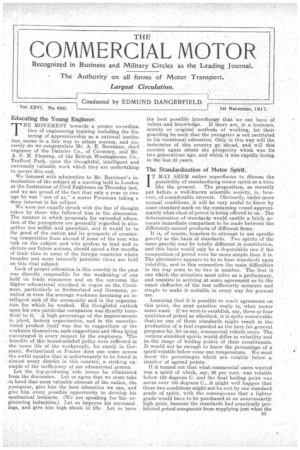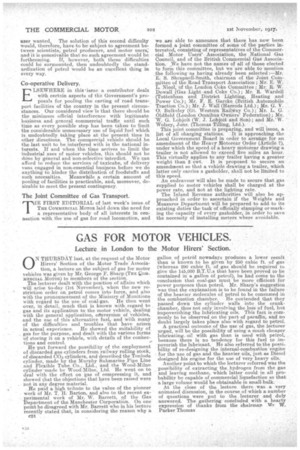Educating the Young Engineer. T HE MOVEMENT towards a proper co-ordination
Page 1

Page 2

If you've noticed an error in this article please click here to report it so we can fix it.
of engineering' training including the fostering of apprenticeship as a national institution seems in a .fair way to attain success, and sincerely do we congratulate Mr. A. K Berriman, chief engineer of the Daimler Co., of Coventry, and Mr. A. P. M. Fleming, of the British .Westinghouse Co., Trafford Park, upon the thoughtful, intelligent and extremely valuable work which they are undertaking to secure this end, We listened with admiration to Mr. Berriman's introduction of the subject at a, meeting held in London at the Institution of Civil Engineers on Thursday last, and we are proud of the fact that only a year or two ago he was "one of us," a motor Pressinan taking a deep interest in his subject.
We were not equally struck with the line of thought taken by those who followed him in the discussion. The manner in which proposals for extended education of the youngsters are generally regarded is altogether too selfish' and parochial, and it would be to the good of the nation and its prospects of countering competition from 4brond if some of the men who talk on the subject and who profess to lead and to dictate our future actions, should spend a few months of their time in some of the foreign countries where broader and more intensely patriotio views are held on this vital subject.
Lack of proper education in this country in the past was directly responsible for the weakeningof our hold on trade commerce and on the converse the higher educational standard in vogue on the Continent, particularly in Switzerland and Germany, resulted in even the average workman becoming an intelligent unit of the community and in the organization for which_ he worked. His thoughtful outlook upon his own particular occupation was directly beneficial to it. A high percentage of the improvements in plant, factory organization, and in the manufactured product itself was due. to suggestions of the workmen themselves, such suggestions and ideas being encouraged in every respect by the employers. 'The benefits of this broad-minded policy were reflected in the home life of 'the workpeople, for rarely in Germany, Switzerland or France does one come across the awful squalor that is unfortunately to be found in ' almost every district in this country, a striking example of the inefficiency of our educational system.
Let the fog-producing Side issues be eliminated from the discussion. Let us agree that we must take , in hand that most valuable element of the nation, the youngster, give him the best education we can, and give him every possible opportunity to develop his mechanical instincts. (We are speaking for the engineering industries.) Let us improve •his surroundings, and give him high ideals in life. Let us have the best possible interchange that we can have of talent, and knowledge. If there are, in a business, secrets or original methods of working, let their guarding be such that the youngster is not restricted in his vocational education. Only in this way will the industries of this country go ahead, and will this country again attain the prosperity which was its two generations ago, and which it was rapidly losing in the last 25 years.
The Standardization of Motor Spirit.
IT MAY SEEM rather superfluous to discuss the . possibility of standardizing motor spirit at a time like the present. The proposition, as recently put before a well-known scientific society, is, however, of considerable interest. Obviougly, under more normal conditions, it will be very useful to know by some standard mark on the containing vessel approximately what class of petrol is being offered to us.. The determination of standards would enable a fairly accurate immediate comparison to be made between the differentIy-named products of different firms.
It. is, of course, hopeless to attempt to use specific gravity as the basis of standards. Two spirits of the same gravity may be totally different in constitution, and this basis would only be a dependable one if the composition of petrol were far more simple than it is. The alternative appears to be to base standards upon volatility, and in this connection the main difficulties in the way seem to be two in number. The first is one wkich the seientists must solve as a preliminary, and consists in arriving at some agreement as to the exact chdracter of the test sufficiently accurate and simple to make it suitable in every way for ..general use.
Assuming that it is possible to reach agreement on this point, the next question really is, what motor users want. If we were to establish, say, three or four qualitiessof petrol as standard, it is quite conceivable that no one of these standards might result in the production of a fuel regarded as the best for general purposes by, let us say, commercial vehicle users. The various standard spirits would differ in volatility and in,the range of boiling points of their constituents. It would xfot be enough to know the percentage of a spirit volatile below some one temperature. We must know the percentages which are volatile below a number of agreed points.
If it turned out that what commercial usera wanted was a spirit of which, say, 60 per cent, was volatile below 150 degrees C. and the final boiling point was never over 180 degrees C., it might well happen that these two conditions might not be.met by one standard, grade of spirit, with the consequence that a lighter grade would have to be purchased at an unnecessarily high price, because the standards had. practically prohibited petrol companies from supplying just what the 23, user wanted. The solution of this second difficulty would, theretore, have to be subject to agreement between scientists, petrol producers, and motor users,' and it in conceivable that DO such agreement would be forthcoming. If, however, both these difficulties could be surmounted, then undoubtedly the standardization of petrol would be an excellent thing in every way.
Co-operative Delivery.
ELSEWHERE in this •issue a contributor deals , with certain aspects of the Government's pro
. posals for pooling the carting of road trans
port facilities of the country in the present circumstances. Our considered view Is that there should be the minimum official interference with' legitimate business and general commercial traffic until such time as every possible step has been taken to limit the considerable unnecessary use of liquid fuel which is undoubtedly taking place at -the present time in other directions. The commercial vehicle should be the last unit to be interfered with in the national interests. If and when the time arrives to limit' the industrial uses of motor vehicles, this should not be thine by general and non-selective interdict. We can afford to reduce the services of taxicabs, of delivery vans engaged in non-essential business. before we do anything to hinder the distribution of foodstuffs and such necessities. Meanwhile a certain amount of pooling of facilities is practicable, and, moreover, desirable to meet the present -contingency,
The Joint Committee of Gas Transport.
TLIE FIRST EDITORIAL of last week's issue of THE COMMERCIAL MoToa. laid down the need for a representative body of all interests in connection with the use of gas for road locomotion, and we are able to announce that there has now been formed a joint committee of some of the parties interested, consisting of representatives of the Commercial Motor Users' Association, the National Gas Council, and of the British Commercial Gas Association. _We have not the names of all of those elected to form this conimittee, but we are able to mention the following as having already been selected :—Mr. E. S. Shrapnell-Smith, chairman of the Joint Committee of the Road Transport Association ; Mr. E. W. L. Nice', of the London Coke Committee ; Mr. R. W. Dowall (Gas Light. and Coke Co.); Mr. R. Wardell (Tottenham and District Lighting, Heating and Power Co.); Mr. F. E. Garcke (British Automobile Traction Co.); Mr. J. Wall (Harrods Ltd.); Mr. G. V. 0. Bulkeley (Gt. Western Railway Co.); Mr. L. G. Oldfield (London Omnibus Owners' Federation); IVIr. W. G. Lobjoit (W. J. Lobjoit and Son); and Mr. W. Wolsey, Junr. (Thomas Tilling, Ltd.). This joint committee is preparing, and will issue, a. EA of all charging stations. It is approaching the Local Government Board in order to arrange for an amendment of the Heavy Motorcar Order (Article 7), under which the speed of a heavy motorcar drawing a trailer is not allowed to exceed five miles an .hour. This virtually applies to any trailer having a greater weight than 2 cwt. It is proposed to secure an amendment so that a vehicle drawing a trailer, which latter only carries a gasholder, shall not be liinited to thirs speed. An endeavour will -also be made to secure that gas supplied to motor vehicles shall be charged at the power rate, and not at the lighting rate. The Inland Revenue authorities will also be approached in order to ascertain if the Weights and Measures Department will be prepared to add to its existing duties the task of officially stamping or marking the capacity of every gasholder, in order to save the necessity of installing meters ;here avoidable.






















